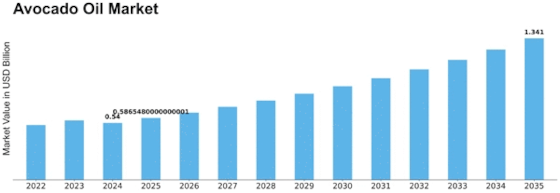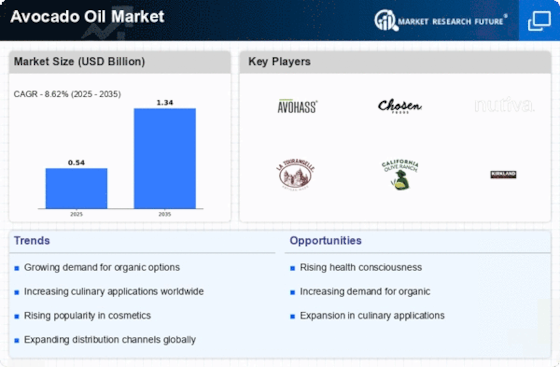Avocado Oil Size
Avocado Oil Market Growth Projections and Opportunities
The avocado oil market is subject to various market factors that shape its trajectory and growth. One of the primary factors influencing this market is the increasing awareness of health and wellness among consumers. Avocado oil, known for its nutritional benefits and heart-healthy properties, has witnessed a surge in demand as consumers seek healthier alternatives in their diets. The oil's high monounsaturated fat content and various vitamins make it a popular choice, contributing to its market expansion. Economic factors also play a significant role in the avocado oil market. As disposable incomes rise, consumers are often more willing to spend on premium and health-conscious products. Avocado oil, positioned as a premium cooking oil and skincare ingredient, benefits from such economic conditions. However, economic downturns may lead to shifts in consumer behavior, with some opting for more budget-friendly alternatives. Global production trends and avocado cultivation practices contribute to the market dynamics. The geographical concentration of avocado production, with major producers like Mexico, Chile, and Peru, influences the availability and pricing of avocado oil. Weather conditions, such as droughts or frost, can impact avocado harvests, leading to fluctuations in the supply chain. Additionally, sustainable and ethical cultivation practices are gaining importance, influencing consumer choices and shaping the market's future. Technological advancements in extraction processes also influence the avocado oil market. Innovations in extraction methods, such as cold-pressing, help retain the oil's natural properties and enhance its quality. As technology continues to improve efficiency and sustainability in production processes, it positively impacts the overall market by meeting consumer expectations for high-quality, minimally processed avocado oil. The culinary landscape and changing dietary preferences contribute to the market factors of avocado oil. As consumers increasingly prioritize healthier cooking oils, avocado oil gains popularity for its versatility and mild flavor. Chefs and home cooks alike are incorporating avocado oil into various cuisines, further driving market demand. Additionally, the trend of plant-based diets and the desire for natural, unprocessed ingredients contribute to the growth of the avocado oil market. Environmental sustainability is a growing concern among consumers, impacting their purchasing decisions. The avocado oil market is not immune to this trend, and consumers are seeking products with eco-friendly packaging, ethical sourcing practices, and a commitment to environmental responsibility. Brands that align with sustainable practices are likely to gain favor in the market as consumers become more environmentally conscious. Distribution channels also influence the avocado oil market dynamics. The rise of e-commerce has facilitated easy access to a wide variety of avocado oil brands, allowing consumers to explore different options and make informed choices. Traditional retail channels remain essential, offering a hands-on experience for consumers who prefer to examine products before purchasing. The interplay between online and offline channels shapes the market's competitive landscape and influences marketing strategies. Cultural and culinary trends contribute to the diversification of the avocado oil market. The oil's incorporation into traditional and fusion cuisines, as well as its use in skincare products, reflects evolving consumer preferences. Cultural factors, such as the popularity of avocados in certain regions, influence the demand for avocado oil. As consumer tastes and cultural influences continue to evolve, the avocado oil market is poised to adapt and grow in response to these changing dynamics.



















Leave a Comment